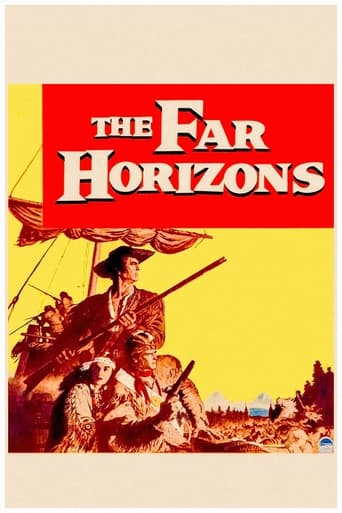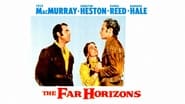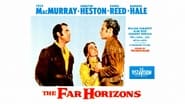JohnHowardReid
Copyright 1955 by Paramount Pictures Corp. New York opening at the Criterion: 20 May 1955. U.S. release: June 1955. U.K. release: June 1955. Australian release: 8 February 1957. 9,826 feet. 109 minutes. Censored by 2 minutes in the U.K. in order to qualify for a "U" certificate.SYNOPSIS: In 1803 President Jefferson sends Lewis and Clark on a jaunt to map and explore the Louisiana Purchase.COMMENT: An impossible script, straight out of dime romance novels, almost defeats this commendable attempt to re-trace the exploratory achievements of Lewis and Clark. Fortunately, there are snatches of action to relieve the triangular tedium, and the scenery — in the hands of Daniel L. Fapp's Technicolor-VistaVision camera — is absolutely breathtaking. Heston tries manfully to overcome the script's deficiencies of dialogue and inadequate characterization, but is ultimately defeated by an especially unbelievable conclusion. Fred MacMurray had presumably read the script in advance. He doesn't even try. Demarest tries vainly to assert himself. Miss Hale is likewise wasted. Oddly enough, it is Donna Reed who is halfway convincing as the never-take-no Indian girl, despite her obviously too smooth make-up and a puerile fade-out that makes nonsense of her one- tracked devotion.A colorful Jefferson has the best lines, allowing Herbert Heyes to easily walk away with Far Horizon's acting honors, such as they are.Maté's direction homes in on the scenery, costumes and sets but makes little sense of the "story".
jjnxn-1
For what it is, an almost total fabrication of the events involved in the exploration of the Louisiana territory, the film is an enjoyable, beautifully shot adventure but for the real story look elsewhere. Donna Reed is ridiculously cast as Sacajawea, Katy Jurado who was actively working in Hollywood at the time would have been far more suitable. She gives an earnest reading of the part but if this is the best the studios could find for her after her Oscar win it's little wonder that she had moved over to TV within a few years. MacMurray although first billed actually disappears for several stretches of the film and Heston, who is ideal in this sort of picture, carries the bulk of the movie.
Wayne Dear
See this movie for the first time on TCM for a primer on Hollywood studio film making in the post-war '50s. Get The Journals of Lewis and Clark edited by Bernard DeVoto for the best story you will ever read about the discovery of the American West, and it's all true. The book is in libraries and at Amizon.com. Second choice: Undaunted Courage by Stephen Ambrose.The stars of the movie (Fred MacMurray, Charlton Heston, Donna Reed) are Hollywood legends but their acting is as uninspired as the script. William Demarest as Sgt. Gass is the only believable character. The combat scenes are total fiction. Only one member of the Corps of Discovery died (of an illness)and only one Indian was shot, for trying to steal a horse from Lewis one night in Monatana on the return trip.As others have reported, the love story is contrived but remains a fascination in Western romance novels about Sacajawea. The joke is on the film makers because The Journals ooze sex between the men of the Corps and women of some of the tribes. Lewis was the medic and half of his medicine it seems was used to treat the men suffering from venereal diseases.Read the book; maybe someday Hollywood will make the movie.Note to reviewers: Use of the term "squaw" has been politically incorrect for some time.
MARIO GAUCI
A crucial event in American history is rendered dull and unexciting by Hollywood convention; the story of the Lewis and Clark expedition which in the early 1800s conquered unclaimed territory for the ever-growing United States. Production values are glossy and there are a few action highlights, but the handling is uninspired and the slowly-paced film emerges an undistinguished effort overall.Casting is variable: Fred MacMurray makes for a staid Lewis but Charlton Heston's Clark is, as ever, at home in such larger-than-life surroundings; Donna Reed (as an Indian squaw!) and Barbara Hale provide the none-too-convincing romantic interest - which actually takes up a good deal of the running-time (before the expedition, both men love Hale but she prefers Heston; when the latter meets up with Reed, they fall for each other - but complications of the boring variety arise when it's revealed that she's been promised by the tribe which has abducted her to a villainous French trapper/guide and, even when she finally escapes and goes back to her people, she's spoken for by a rash young Indian brave!). This allows Heston to engage in fisticuffs and he even falls out with MacMurray, but the audience's interest is never more than dimly aroused; however, veteran William Demarest is on hand as a level-headed sergeant who actually keeps the company together during such trying times.Anyway, the film is watchable enough in itself - though it's better approached, perhaps, as a Western rather than a widescreen spectacular (with which Heston would soon come to be identified)...and, in any case, it's miles behind such celebrated 'epics' of American colonialism as John Ford's DRUMS ALONG THE MOHAWK (1939) and King Vidor's NORTHWEST PASSAGE (1940).





